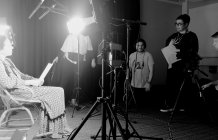
Filming of Dulce Maria Loynaz, a key figure in Cuban literature.
Influence of remarkable Hispanic women honoured though major historical project
More remarkable Hispanic female pioneers in journalism, sport and the arts have been honoured as part of a major historical project.
Cartasvivas, led by Professor Nuria Capdevila-Argüelles and Dr Isabel Santafé, from the University of Exeter, is a record of the amazing work by women living in or affected by the Spanish Franco dictatorship.
Professor Capdevila-Argüelles, Dr Santafé, students and actors have worked together to produce “filmic capsules” designed to bring to life the women’s writing. The films remind people how these women understood discrimination and gender violence, and their struggles to have a voice, as well as their thoughts on their sexuality or motherhood.
The growing online library, based on their letters, memoirs, interviews and other writing, will soon feature three new films for Ana Maria Martinez Sagi, Dulce María Loynaz and Concha Mendez. Filming took place at the University of Exeter this month.
Ana Maria Martinez Sagi, played by Teresa del Olmo, was a Catalan poet, trade unionist, journalist, feminist and athlete who lived between 1907 and 2000. She was a javelin national champion and became the first female director of a Spanish football club. During the Spanish Civil War she worked as a journalist and was then exiled to France.
During World War II Sagi joined the French Resistance and evaded capture by the Gestapo. Afterwards she worked for the Aga Khan and then moved to the United States where she taught at the University of Illinois. After the death of Franco, she returned to Catalonia where lived in obscurity near to Barcelona.
Poet Dulce María Loynaz, played by Leila Arias, was a key figure in Cuban literature. She lived between 1902 and 1997 and was awarded the Miguel de Cervantes Prize in 1992.
Concha Mendez, played by Adela Leiro, was a leading Spanish poet and dramatist who lived between 1898 and 1986. After a privileged upbringing she travelled the world, meeting Luis Buñuel who became her first boyfriend. This led to her becoming friends with Rafael Alberti, Federico García Lorca, and Luis Cernuda who encouraged her to join their group which become the Generation of '27. She published her first collection of poetry, Inquietudes (Concerns) in 1926.
In 1931 Lorca introduced her to her husband, the poet and publisher Manuel Altolaguirre. They founded the printing press Verónica. During the Spanish Civil War they lived in England, France and Belgium. At the end of the Civil War they went into exile in Paris. In 1939 they re-established their printing press in Cuba. Manuel later divorced Concha, leaving her for the Cuban actress/producer, María Luisa Gómez-Mena y Vivanco. They were both killed in a car accident while returning from the San Sebastián International Film Festival on 23 July 1959.
Mendez didn’t write between 1944 to 1979 except for a poetry anthology in 1976. Her last book, Vida o río (Life or River), appeared in 1979. Her memoir – based on tapes recorded by her granddaughter, was published in 1990.
The filming was carried out by production staff from Exeter’s Phoenix Arts Centre.
Professor Capdevila-Argüelles, said: “We want to create a tribute to these important historical figures and ensure their work is not forgotten. These cartasvivas give these incredible women a voice once more – these are their words brought to life again. The format of these visual letters allows us to show their talent and struggles in a really powerful and direct way.”
The films, sponsored by the Santander Foundation, are shown on a dedicated YouTube and at www.cartasvivas.org.
Date: 27 May 2022
